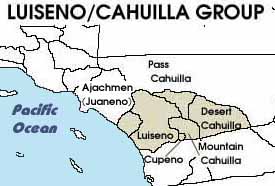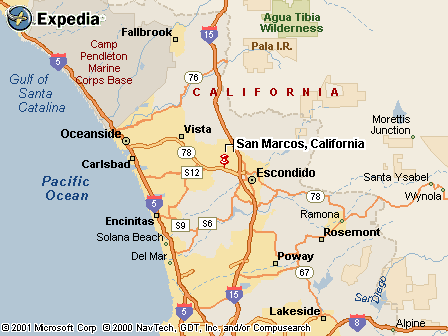|
|
Canku Ota |
|
|
(Many Paths) |
||
|
An Online Newsletter Celebrating Native America |
||
|
January 12 , 2002 - Issue 53 |
||
|
|
||
|
Students to Learn Luiseno Language for Credit at Palomar |
||
|
by Bruce Kaufmann
Staff Writer North Country Times-December 27, 2001
|
||
|
|
 SAN
MARCOS ---- Luiseno, a language indigenous to San Diego County and believed
to be the first spoken here, will be taught for credit next year for the
first time at Palomar College, the chair of the American Indian Studies
department said on Wednesday. SAN
MARCOS ---- Luiseno, a language indigenous to San Diego County and believed
to be the first spoken here, will be taught for credit next year for the
first time at Palomar College, the chair of the American Indian Studies
department said on Wednesday.
If a fall offering in another native language, Cupeno, succeeds, it may also become part of the regular Palomar curriculum, said professor Linda Locklear. "We're very excited and very happy about this," she said in an interview Wednesday. "I've been at Palomar College 27 years and we've been trying to get people to recognize these languages should be taught." The two-year community college has an enrollment of over 30,000 students and serves a district stretching from Borrego Springs to Oceanside. Luiseno, among 90 languages used in California long before any European language was spoken, is the native language of several tribes around North County and southwest Riverside County, Locklear said. The tribes include the Rincon, La Jolla, Pechanga, Pauma and Pala. A group of Pala Indians also speaks Cupeno. Locklear, a sociologist and a Lumbee Indian from the southeast part of North Carolina, said there is a movement growing in the tribes and among educators to ensure that the language is learned by Indian children and any interested students. "I think there's always been an interest," Locklear said, "but you've got to have institutions and educational settings to support the importance of these languages. Then, when kids go to school, they see that their language is integrated into the educational system as well." Palomar College has had two trial runs of Luiseno classes this past fall and last summer to test whether interest was sufficient to set up a credit-granting course. The non-credit courses, taught by linguist Eric Elliott, an elementary school teacher in La Mesa, attracted some 100 students. This spring Luiseno will be offered again as a pilot at the college's education center on the Pauma reservation and beginning in December 2002, it will be offered for credit for the first time. The credits can be transferred and applied toward a four-year degree. The Palomar trustees voted to add the course at their Dec. 11 meeting. Locklear said one aim of the classes will be to train people in Luiseno and Cupeno so that they can teach it. She said she wants to bring the languages into the curriculums of pre-schools and grades k-12. Elliott has worked with Head Start and tribal school teachers, especially at the Rincon Reservation charter school and in the Valley Center-Pauma Unified District. It's important to teach and preserve these languages, Locklear said, because they "represent a people" "You pray, sing and carry on important aspects of your culture through your language," she said. "I'd like to see my grandchildren grow up and be able to speak these languages, languages that were indigenous to their lives. "Luiseno is the first language in this area," she said. "It broadens us as human beings (to learn it)."
|
|
|
||
|
|
||
| Canku Ota is a free Newsletter celebrating Native America, its traditions and accomplishments . We do not provide subscriber or visitor names to anyone. Some articles presented in Canku Ota may contain copyright material. We have received appropriate permissions for republishing any articles. Material appearing here is distributed without profit or monetary gain to those who have expressed an interest. This is in accordance with Title 17 U.S.C. section 107. | ||
|
Canku Ota is a copyright © 2000, 2001, 2002 of Vicki Lockard and Paul Barry. |
||
|
|
|
|
|
The "Canku Ota - A Newsletter Celebrating Native America" web site and its design is the |
||
|
Copyright © 1999, 2000, 2001, 2002 of Paul C. Barry. |
||
|
All Rights Reserved. |
||

